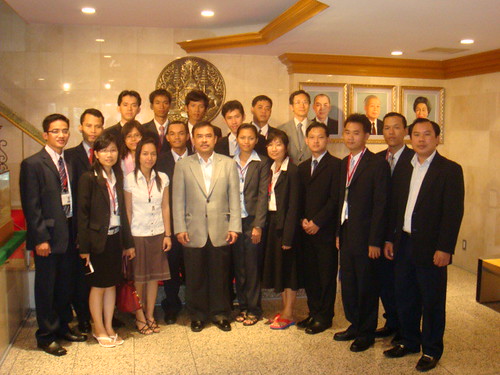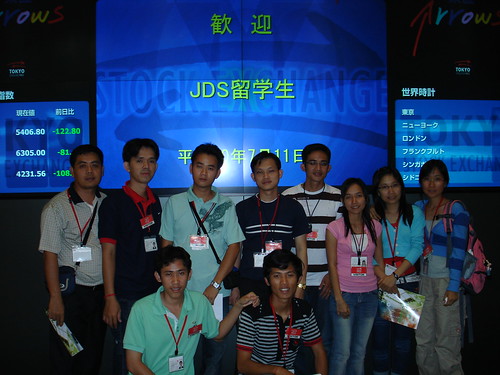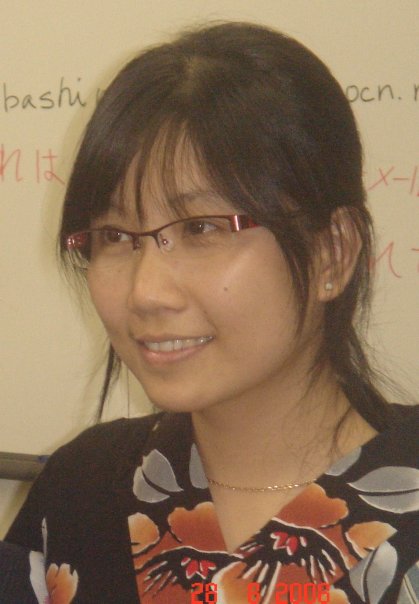These are what I have learnt today :-)
Thursday, October 9, 2008
International Standardization and Information- Communication Industries
These are what I have learnt today :-)
Tuesday, October 7, 2008
My Master Student's Life at Waseda University
My real Master student’s life in Japan began. For this fall semester, I take seven subjects; I have to make strong efforts especially on subjects that are quite new to me such as Basic of Modern Finance Theory, Economics and Social Impact Analysis of Telecommunication. For other courses like Industry R&D Activity in Information and Communication Technologies, Internet, International Standardization and Info-Communication Industries, Ubiquitous Health and Welfare Information System, and Media Industrial Organization and Policy are okey, I guess. Let’s wait and see ..
I would also like to take a course “ CIO theory”; it is quite interesting; will consider it next semester then…..
Most are bilingual courses, English and Japanese, because students came from different directions for the world; some cannot understand Japanese, while some cannot understand English, therefore, two-pronged approach is worthy used in this situation.
Wednesday, September 24, 2008
Waseda’s 3 ceremonies in a row: GITS commencement, Waseda Entrance Ceremony, and GITS Entrance Ceremony.
Bong Bong, Congratulations!!! You have not tried for nothing! At last, you are qualified Master degree holders!

See! ICT makes our life easier, you don't have to waste time and money travelling back and forth :-)

Sunday, September 21, 2008
Preparatory Japanese Language Training
Following the long orientation was Japanese Training Course conducted at Waseda Hoshien. All Cambodian fellows in Tokyo took 初級 (elementary) course with some other students from Laos, Myanmar, The philippines, and Kyrgyzstan. For me, my course was from July 18th to August 29th, 2008 which is equal to 152 hours. I ‘d been studying every Monday to Friday, and five hours per day: 9:30am -12:00am, and 1:30pm – 4:00pm.
Japanese language is quite difficult to learn, but it is very important for surving in Japan espcially in Tokyo. Hence, the class was very busy due to overloaded homework everyday. However, the class was very interesting thanks to the professional skill and efforts of all sensei.せんせい、いろいろ おせわに なりました。どうも ありがとう ございました。
I was finally given a Japanese certificate:
Honestly, my Japanese is still poor, I still cannot full understand what Japanese people are saying. It’s pretty easier to ask question, but getting answer is a matter :-)
First JDS orientation
From the second day of entering Japan until July 17th 2008, there was an 12 days long (no program for Sat and Sun) orientation prepared by JICE at TIC - Tokyo of International Center, for all JDS fellows who came to Narita airport, Tokyo.
The program of the orientation included:
Briefing and Orientation on Rules of Japanese Grant Aid for Human Resource Development Scholarship (JDS) Fellows and Information for Living in Japan.
Exchange view with senior JDS fellows on academic life and research methodologies as well as daily life.
Welcome Reception with the presence of officials from respective embassies, professors and staffs of respective universities, ministry of Foreign Affairs, and JICA.
Opening bank account
Lecture “Policies and Administration of Japan” by Mr. Akira Nakamura, Pro. Graduate School, Meji University
Lecture “Outline of JICA’s Activities and Expectation for Participants” by Mr. Masaei Matsunaga, Deputy Director General for Training Affairs and Citizen Participation Dept. JICA
Move to Tachikawa-Bosaikan by bus; a center is designed in order to exercise how to prevent yourself from various emergency and natural disaster.
Workshop on “Cross Cultural Understanding” by Ms. Mariko Watanabe, Certified clinical psychologist of Tokyo International Center, JICA
Lecture “ The Japanese Experience through Economic Growth and Restructuring in Post War” by Mr. Ryokichi Hirono, Pro. Emeritus, Seikei University.
Lecture “ Japanese Society and Culture” by Mr. Kenichi Namai, Pro. Waseda University
Culture program/ Inspection of Tokyo:
Asakusa
Tokyo Metropolitan Government.
Imperial Palace
Alien registration at the Shinjuku Ward Office
On July 10th 2008, some students from Laos, Cambodia, Myanmar, and Kyrgyz moved to branch office IUJ – Internation Universtiy of Japan, and on July 14th 2008, some moved to branch office Toyohashi University of Technology, Nagoya University, and tsukuba University.
Handouts and CDs were also provided for reference :-)
Friday, September 19, 2008
First Impression of Japan

Most JDS students from the ten countries were arranged to stay in one of the most famous hotel chains in Japan, Shinjuku Washington Hotel, surrounded by major commerial and administrative center as well as department stores, specialist electronic and camera shops, cinemas, restaurants and bars. Tokyo is one of the very costly cities in the world where everything is expensive, so most of the time I spend, I like to convert and compare to the price in my country, Cambodia. Having been in Tokyo for amost 3 months, I am now graduatlly accustomed to this such a high cost of living. There are also 100 yen shops available where most goods like snack, drink, vegetable, meat, fruit, stationery,.. cost 100yen or so.
Let me briefly describe about Japanese people in Tokyo. They seem to be so busy with their work. Giving value to the time, every morning the crowd in neat suit hurriedly walk back and forth believing that time and tide wait for no man. I do uphold this spirit of being punctual. Moreover, they are polite behaving in a way that shows awaressness of and caring for other's people feeling; they respect each other, in general.

Though there were news about suicides and murders, Japan is still one of the world's safest countries. I feel secure to live and learn in japan.
Thursday, September 18, 2008
Pre-departure English Training Course


















